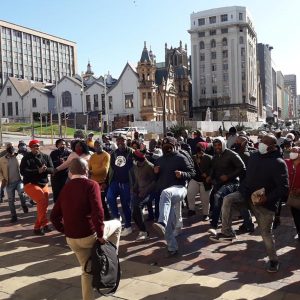Eastern Cape healthcare woes worsen
The province with the second highest number of deaths related to Covid-19 has been experiencing numerous challenges while fighting the pandemic, and they don’t seem about to abate.
Author:
23 June 2020

In the Eastern Cape, which now has the third most Covid-19 infections but the second highest death toll in South Africa, public hospitals have stumbled from one crisis to the next while fighting the deadly pandemic. When its hospitals haven’t been struggling with understaffing, they have found themselves with insufficient personal protective equipment (PPE), overworked health workers and poorly managed facilities.
This has caused a great deal of dissatisfaction among frontline workers and resulted in widespread protests, especially in the province’s largest city, Port Elizabeth, where general workers at Livingstone Hospital have been on a go-slow for four weeks. Health workers say the strike has left the hospital’s accident and emergency unit drowning in piles of waste and unwashed linen, creating an unsanitary working environment.
The general workers, who comprise cleaners, porters, cooks and laundry workers, are demanding overtime and PPE. They downed tools on Friday 12 June and protested inside the emergency ward, calling on management to resolve the issue.
Related article:
“The general assistants are refusing to clean the casualty department and it is filthy, and that poses a health risk for us as well as the patients,” said a Livingstone Hospital nurse, who spoke to New Frame on condition of anonymity.
“A risk assessment has not been done in weeks. It is meant to be done by the doctors on staff after exposure to Covid-19-positive patients. There are questions that are asked, for example, how were you in contact with the person? What were you wearing [in terms of PPE] and how close were you to the person? In other words, were you maintaining social distance? This is also for people who were contacts but show no symptoms.
“It’s been three weeks since this has been done and the hospital hasn’t been cleaned. It’s even worse for nurses and Covid-19 patients. The rooms which are supposed to be cleaned after every patient are not being fumigated. And now we are having an increase in the number of staff who are testing positive.”
Fears of a widespread outbreak
The National Education, Health and Allied Workers Union (Nehawu) has been conducting inspections in public hospitals in the Eastern Cape. On its website, it states that the aim of these visits is to ensure that the hospitals comply with the Occupational Health and Safety (OHS) Act as well as to check “the available stocks of PPE, training of workers to deal with Covid-19 and the availability of workplace health and safety committees”.
Nehawu says workers and union members have complained about Livingstone Hospital being understaffed and not having sufficient PPE. The hospital is one of the provincial government’s Covid-19 quarantine sites in Port Elizabeth. With a daily intake of Covid-19 patients, nurses are concerned that the general worker strike will lead to a widespread outbreak.
Another Livingstone Hospital nurse, who also asked to remain anonymous, said: “On Wednesday [10 June] we were told to work with one pair of gloves and after that wash those gloves. The quality of the gowns is something else, [I am] not sure if it can be approved by the World Health Organization. Our management is aware of these problems but nothing is done. We raised our frustration with them last week Wednesday [3 June]. Nothing was done and even this week [11 June] we handed over the petition but nothing was done up until now. We are really frustrated.”
Related article:
Health workers also accuse management of allegedly purposely delaying the Covid-19 test results of patients and staff. “There is no transparency at the hospital. When someone tests positive, it becomes difficult to get those results in time. Then there is no linen here, patients are also not being served food, and it all comes back to the nurse. The whole area is a health hazard now,” said another nurse.
Hospitals in Port Elizabeth and East London, like those elsewhere in the country, have experienced an increase in road accident-related intakes following the return of alcohol sales on 1 June. Nurses are worried that patients admitted to the emergency ward might be at risk of contracting Covid-19 as the state of public hospitals deteriorates.
Broken promises
The Eastern Cape Department of Health had been under the spotlight even before Covid-19 infections surged past 12 600 by 18 June, when 179 health workers in the province had been diagnosed with the virus.
According to an article on the Daily Maverick website on 3 June, the spokesperson for Eastern Cape premier Oscar Mabuyane, Mvusiwekhaya Sicwetsha, said the premier “has directed the department to ensure that issues raised by the workers are resolved, provision of healthcare workers to patients is prioritised, and all the matters raised by the healthcare workers are addressed with urgency so that we can protect and save lives”.
A week later, none of the demands of general workers at Livingstone Hospital had been met. The state of the hospital remained the same, unsanitary and volatile. When New Frame spoke to Sicwetsha, he referred it to health department spokesperson Siyanda Manana, who stated that the department was “unaware of the current situation at the hospital but had been aware of staff grievances”.
Related article:
New Frame also spoke to Vuyo Nodlawu, regional chairperson of the Democratic Nursing Organisation of South Africa (Denosa), who said the union was only made aware of the situation at the hospital on 7 June and that it had since been engaging management to find a solution.
“This impacted service delivery when the cleanliness of the place became unbearable. The clinical staff were confronted with an inability to conduct their daily work in such an infectious environment,” said Nodlawu. “They called up the hospital management to request for the facility to be decontaminated and deep cleaned. Due to the urgency of this matter, a cleaning company was outsourced and came by, but it was met with resistance and ordered to march out by the aggrieved employees, who were waiting for a response from hospital authorities about their overtime payments.”
Intervention brings some relief
Denosa, Nehawu and the health department held a meeting on 14 June in an attempt to resolve the general workers’ grievances. It became apparent that there had been a management crisis at the hospital as seven managers, including the chief executive, had resigned, said Nehawu, which donated 600 N95 masks, 600 visors and 2 000 immune boosters to frontline workers at the hospital.
“We are happy to report that a letter was written by the deputy director general confirming that payment runs for overtime will be made on 17 June and also on 23 June,” said Nehawu spokesperson Khaya Xaba. “The human resource department of the hospital will meet weekly with the Nehawu branch leadership to process and deal with issues of recruitment, including the filling of the 100 posts currently advertised.
“The hospital manager responsible for OHS matters must meet weekly with all shop stewards and deal with all OHS-related matters, including statistics around the infection of workers and the issue of workers who are above the age of 60. The meeting noted that some workers have been charged for refusing to work under unsafe conditions. The hospital management has agreed to withdraw all Covid-19-related charges against workers. Lastly, the clinical manager dealing with OHS matters must forward the report presented at the meeting for further scrutiny.”
Related article:
The health department confirmed the meeting and its agreement with the unions. “The overtime has been approved and will be paid this month,” Manana said. “The process of hiring 100 GAs [general assistants] is unfolding and will be completed soon. PPE has always been available and given to workers [in spite of] the challenges that exist concerning procurement. [Litha] Matiwane has been placed in [the Nelson Mandela Bay Metro health department] and coordinates all Covid-19-related issues. Thus he has been handling the concerns and is ready to assist in finding solutions.”
But as soon as one fire is put out, another flares up, resulting in Eastern Cape residents and healthcare workers finding themselves at risk as Covid-19 infection and death rates continue to rise. New Frame has been told that staff members at a rural hospital in the Eastern Cape have also gone on strike.
According to the relative of a patient, “Cofimvaba Hospital nurses are on strike. Patients are left unattended since this morning. The last time patients saw a doctor was on 5 June. Apparently the doctors don’t come to work on weekends. No one is telling them [patients] anything except that they see the nurses toyi-toying outside.”




